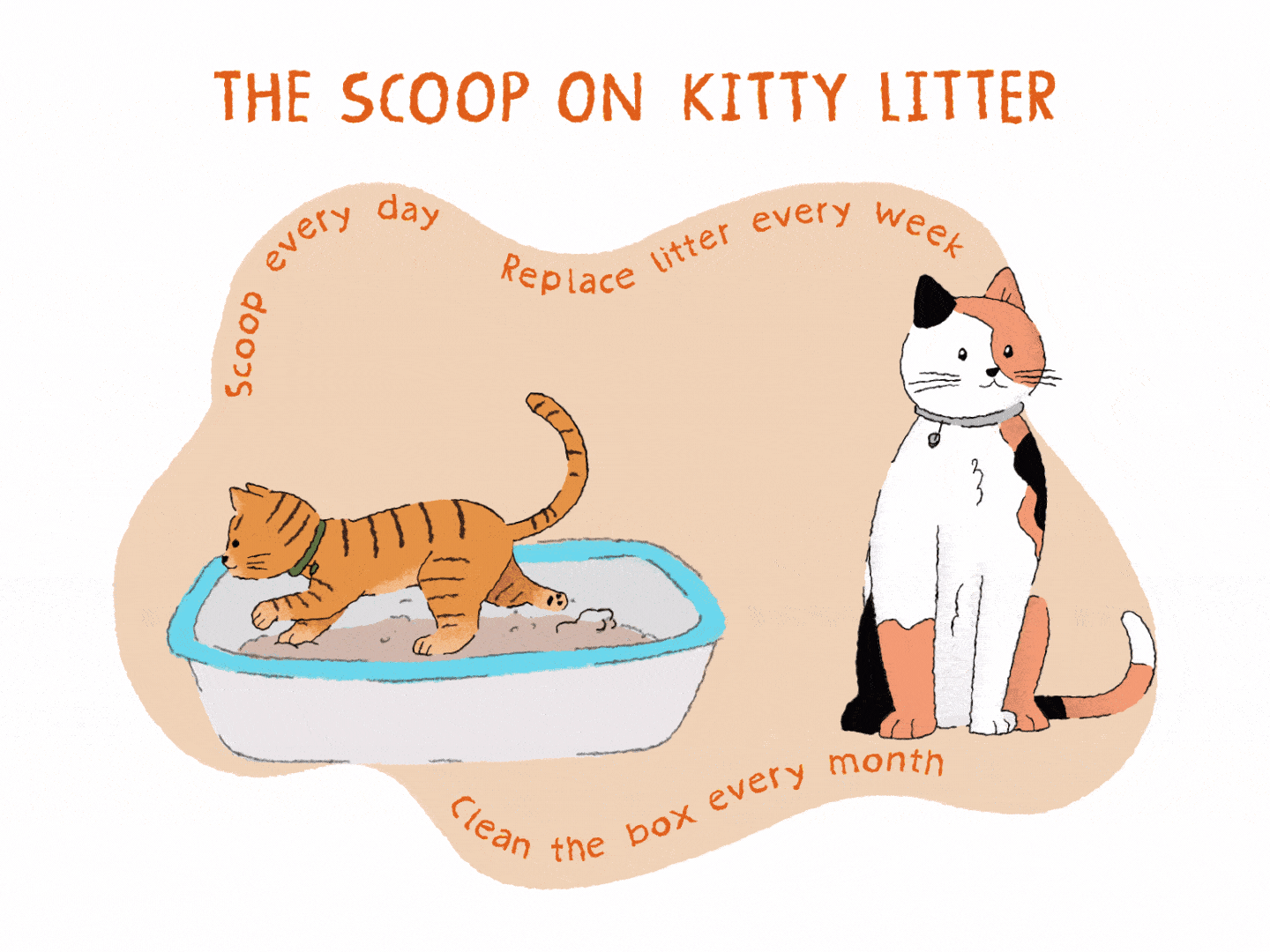Yes, you are supposed to scoop cat pee. Regularly scooping ensures a clean litter box and a healthy environment.
Maintaining a clean litter box is essential for your cat’s health and well-being. Cat urine can produce strong odors, making your home unpleasant. Regularly scooping cat pee prevents these odors and reduces the risk of bacterial growth. It also encourages your cat to use the litter box consistently.
Neglecting to scoop can lead to litter box aversion, causing your cat to urinate elsewhere. A clean litter box promotes good hygiene and keeps your cat happy. Make it a routine to scoop daily, ensuring a fresh and comfortable space for your feline friend. Regular cleaning also helps you monitor your cat’s health by spotting any changes in urine.
Importance Of Litter Box Hygiene
Keeping the litter box clean is very important. Dirty litter boxes can make your cat sick. Germs can grow in dirty litter. Scoop cat pee and poop every day. This helps keep your cat healthy. Cats need a clean place to do their business. A clean litter box stops bad smells too. Everyone likes a clean home.
Cats might stop using a dirty litter box. They may pee outside the box. This can be a problem. Clean litter boxes make cats happy. Cats like clean places. Scoop cat pee and poop to keep your cat’s behavior good. Clean boxes also make your home smell better. Happy cats use their litter boxes.

Credit: ontariospca.ca
Types Of Cat Litter
Different types of cat litter handle waste differently. Clumping litter makes it easy to scoop cat pee, maintaining cleanliness. Non-clumping litter requires full changes to manage odor effectively.
Clumping Vs. Non-clumping
Clumping cat litter forms solid clumps when it gets wet. These clumps are easy to scoop. Non-clumping litter absorbs moisture but does not form clumps. It needs to be changed more often. Clumping litter helps keep the litter box cleaner. Non-clumping litter can be cheaper. Both types have their pros and cons. Choose the one that fits your needs.
Natural Vs. Synthetic
Natural cat litter is made from plant-based materials. It is eco-friendly and biodegradable. Synthetic litter is made from chemical compounds. It often has better odor control. Natural litter can be safer for cats and the environment. Synthetic litter usually lasts longer. Consider the health of your cat and the impact on the planet. Pick the litter that works best for you and your cat.
Scoop Frequency
Cats are clean animals. They prefer a tidy litter box. Scooping daily helps keep the litter box fresh. It also reduces odors in your home. Fresh litter encourages cats to use the box. Daily maintenance is essential for your cat’s health. It helps prevent urinary issues. A clean box makes your cat happy.
Each cat needs its own space. Multiple cats mean more scooping. More cats equal more litter boxes. Scoop twice a day if you have many cats. It keeps all the boxes clean. This prevents territorial issues. Cats like their own clean box. Regular scooping avoids health problems. Happy cats mean a happy home.

Credit: www.reddit.com
Tools And Techniques
A metal scoop is better for tough clumps. Plastic scoops are lighter but may break. Scoop size matters. A large scoop picks up more waste quickly. A small scoop is good for tight spaces. Make sure the scoop has slotted holes. This helps sift out clean litter.
Start by removing solid waste. Use the scoop to dig under the clump. Lift it out carefully. Do not shake the scoop too much. This keeps pee clumps from breaking. Dispose of waste in a bag. Tie the bag tightly. Wash your hands after scooping.
Managing Odor
Odor control products can help keep your home fresh. Use litter deodorizers to reduce smells. Activated charcoal can absorb bad odors. Baking soda is another great option. Sprinkle it in the litter box. Air fresheners can mask the smell. Choose a safe product for pets.
Good ventilation helps reduce cat pee odor. Open windows for fresh air. Use a fan to circulate air. Place the litter box in a well-ventilated area. Avoid closed spaces. Clean the litter box often. This prevents strong smells. Wash the box with mild soap and water.
Preventing Litter Box Problems
Cat pee in the litter box can be a problem. Sometimes, cats miss the litter box. Other times, they refuse to use it. This can happen if the box is dirty. Cats like clean spaces. A smelly box will turn them away. Another issue is the location. The box should be in a quiet place. Loud noises can scare cats. This makes them avoid the box. The type of litter also matters. Some cats are picky. They prefer certain textures. Trying different litters can help find the right one.
Scooping the litter box daily is important. This keeps it clean and fresh. Changing the litter often also helps. A clean box attracts cats. Placing the box in a quiet spot is key. This makes cats feel safe. Using the right kind of litter can make a big difference. Some cats like fine grains. Others prefer clumping litter. Experiment to find the best option. Adding more litter boxes around the house can help. This gives cats more choices.
Health Indicators
Cat pee can tell a lot about health. Look for changes in color and smell. Normal pee is pale yellow. Dark pee may mean dehydration. A strong smell can indicate infection.
Check for amount and frequency of pee. Too much or too little can be a problem. Frequent trips to the litter box might signal an issue.
See a vet if you notice blood in the pee. Blood can mean serious health issues. Also, consult a vet if your cat strains to pee. Straining could indicate a blockage.
Consult a vet if your cat shows any sudden changes in litter box habits. Changes can be a sign of illness. Always keep an eye on your cat’s bathroom behavior.
Eco-friendly Practices
Use biodegradable cat litter for a greener home. It breaks down quickly and doesn’t harm the planet. Choose litter made from natural materials like wood, corn, or paper. These options are better for the environment. They also help reduce waste in landfills.
Scoop cat pee daily to keep the litter box clean. This helps reduce waste and keeps your cat healthy. Use a reusable scoop instead of disposable ones. Wash the scoop often to maintain hygiene. Store used litter in a compostable bag before disposal. This practice is better for the environment.

Credit: www.amazon.com
Frequently Asked Questions
What Happens If You Don’t Scoop Cat Litter?
Neglecting to scoop cat litter leads to unpleasant odors, bacterial growth, and potential health risks for both cats and humans.
What Happens If You Don’t Clean Up Cat Pee?
Cat pee can cause strong odors, attract more peeing, and lead to health issues. Clean promptly to avoid stains.
How To Scoop Pee In A Litter Box?
Use a slotted scoop to sift through the litter. Remove clumps of pee and dispose of them. Refill with fresh litter if needed.
Should You Scoop Cat Litter Every Day?
Yes, scoop cat litter daily. It prevents odor, keeps the litter box clean, and ensures a healthy environment for your cat.
Conclusion
Regularly scooping cat pee keeps your home clean and your cat healthy. It prevents odors and reduces infection risks. A clean litter box ensures a happy cat. Prioritize this simple task for a healthier environment. Consistency is key to maintaining a pleasant living space for you and your feline friend.

Hello, this is Frank Swanson, the owner, and operator of Pet Info Hut. I created this website as a way to share my love of pets with the world. I have over 7 years of experience working with animals, and I have a passion for helping people care for their pets. I hope that you find my website useful and informative. Thanks for visiting!
